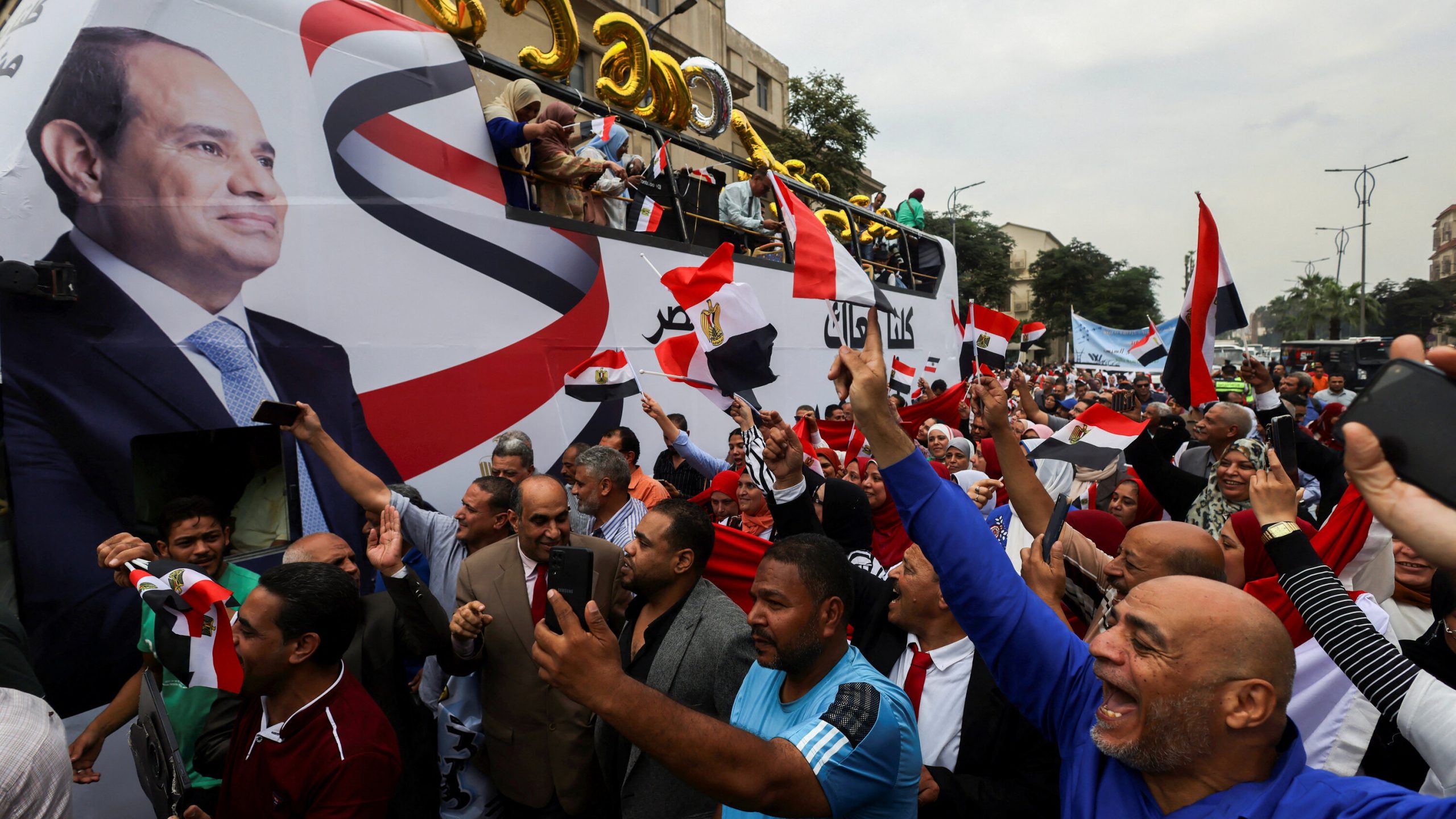Amidst the latest atrocities in the Middle East, the world’s attention has again turned to commonly overlooked regional powers such as Egypt. Until recently, many of these powers had faded from political discussion since the end of the Arab Spring, superseded by the Saudi Vision 2030 seizing social media to highlight the progressive Gulf and concerns from both Western and Middle Eastern states over potential Iranian aggression. That is not to say that Egypt’s economic and political importance changed: the Suez Canal is still one of the main oil routes; its population makes up one fifth of Arabs; its military is the among the strongest in the world; and it is has always been one of the leading states in North Africa, the African Union, and other regional and international alliances. Geographically, the state’s borders connect North Africa, the depth of the continent, the Levant, the Gulf states by the Red Sea, and Mediterranean Europe. These overwhelming advantages have long rendered Egypt an economic and political “queen piece.” Alas, the common international dogma that Egypt is “too big to fail” leads to consistent foreign intervention, both in past elections and the upcoming elections this December.
The Egyptian Armed Forces (EAF) had, for the most part, dominated the country since 1952 after the coup d’état that toppled King Farouk, King of Egypt and the Sudan, and ended British influence in the country. The brief period of poorly managed civilian rule from 2012 to 2013 under Mohammad Morsi taught the international community the ineffectiveness of this leadership style. Therefore, although the current president’s regime is clearly authoritarian and known for its suppression and hasty practices, it is inevitable and, unfortunately, necessary to protect Egypt’s borders and sovereignty.
Leviathan in Practice: Conditioning Egypt to a Presidential Authoritarianism
Beginning in 1952, the effort to transform Egypt from an established constitutional monarchy into a new republic required the Free Officers, the revolutionary EAF members who overthrew King Farouk, to redirect the public’s attention to different priorities the old regime overlooked. Notably, the new central responsibility was for the leadership to maintain Egyptian sovereignty and security. This directive, in accordance with the fundamental idea of fascism, swiftly took a manipulative and authoritarian turn.
After the establishment of the Revolutionary Command Council (RCC), the Officers disagreed on the next steps for that transitional period. Mohammad Naguib, the RCC Chairman and first President of Egypt, led the bloc that believed that the Council’s directive was limited to deposing the obstinate King, ending the Wafd Party’s corrupt leadership, and expelling any British influence within the borders. Naguib prioritized the drafting of a new republican constitution, the reincarnation of civilian political activity, and the revitalization of the bureaucracy and national institutions.
The Vice Chairman, Gamal Abdel Nasser, a young mid-ranking officer, led the opposing faction that believed in the country’s frailty, the duty to decimate all old political figures, and the importance of maintaining a new secure regional power. When Naguib counted on the trust of the people, which was overwhelming at the time, Nasser depended on security and foreign powers. Nasser, therefore, rallied the rest of the Freedom Officers, accusing Naguib of conspiring with the old “traitors” like the Wafd Party and the Muslim Brotherhood. Before that, junior officers pressed President Naguib to lead a corrective coup against the rogue officers, but he remained firm in his trust towards his revolutionary partners and the will of the people.
Unlike most revolutions of the time, Nasser did not have a solid party backing; his supporting political hydra was the military. Besides the few domestic projects that Nasser begged foreign power to help accomplish, the leadership switched its focus on securing the regime from foreign powers and the old “political mercenaries,” two terms that could practically be applied to anything the administration pleased. The public especially embraced this vision after Egypt’s defeat in the Six-Day War with Israel and Nasser’s sudden death. When the then-Vice President Anwar Sadat, a covertly anti-Nasserism Free Officer and Muslim Brotherhood sympathizer, succeeded the dead “hero,” he aimed to de-Nasserize the government by limiting civil repression, retreating from a socialist regime, and renovating the national institutions. Still an unelected former military leader, Sadat was on track to accomplish his goals as he freed the Muslim Brotherhood factions from Nasser’s concentration camps and gained back control of the Suez Canal and the Sinai Peninsula in the 1973 Yom Kippur War.
However, Sadat’s desire for reconciliation with foreign adversaries precipitated the reset to an Egyptian security state. Upon the public’s disapproval of domestic economic liberalization and the peace talks with Israel, Sadat seized his democratic notions as he arrested any political opposition, including the Muslim Brotherhood again, to the point that he exiled the Coptic Orthodox Pope Shenouda III to the Nitrian Desert for criticizing the peace talks. Upon Sadat’s assassination in 1981, hopes for democratization died as then-Vice President Hosni Mubarak took over and instituted emergency law for the next 30 years, suspending constitutional rights and habeas corpus while expanding police forces and censorship.
Square One: The Rise of President El Sisi
During the devastating uncertainty surrounding Sadat’s assassination, Mubarak framed himself as the compassionate savior of Egypt. Reclaiming Taba, the last Israeli-controlled territory in Sinai, Mubarak managed to imitate Nasser’s popularity as he strengthened his security state, and he successfully did for the first 10 years. After then, and with the public’s piling outcry on his lengthy, weak reign and plans to instate his son, Gamal Mubarak, as his successor, Mubarak resigned in 2011.
As the first democratically elected president, Mohammad Morsi represented real hope to strengthen national institutions and end the military’s monopoly. Instead, he marginally expanded the presidential powers to become the head of state and government, prevented the judiciary from blocking any of his decrees, and neglected the EAF’s national security recommendations. He also exposed Egyptians to a long-forgotten practice: partisanship. Morsi’s partisanship, nonetheless, was limited to extreme Islamism and negligence of partisan and sectarian violence.
On July 3rd, 2013, EAF Commander-in-Chief and Field Marshal Abdel Fattah El Sisi announced the overthrow of Morsi and installation of the Chief Justice of the Supreme Constitutional Court Adly Mansour as the temporary head of state. From there, El Sisi tactically waited on his announcement to run for president to give the military time to recover its power and privileges, leading to one of the largest killings of demonstrators in a day. At the same time, El Sisi and the military organized a “Sisi-mania” that dominated the media and the streets. “CC,” the brand for the potential candidate, covered walls as graffiti and was sold as jewelry. This campaign successfully conditioned Egyptians back to embracing a security state that terminates the enemy—who is defined by the state itself. In March 2014, El Sisi announced his presidential bid against Nasserist Hamdain Sabbahi, winning with 96%. This would mark the official failure of the 2011 Revolution.
In terms of his grip on power, El Sisi is nothing less than Nasser, Sadat, or Mubarak. Even without the institution of constant emergency law, El Sisi managed to stretch all available resources and even planned the 2019 constitutional referendum with the General Intelligence Service, whose deputy director is El Sisi’s son, Mahmood. This referendum, which passed by a surprising 88.83%, extends presidential terms from 4 to 6 years, and it specifically grants the incumbent president the right to run for a third term. Changes to Articles 185, 189, 190, 193, and 204 transform the judiciary branch so it is held accountable to the president while its powers are limited. Article 200 expands martial court jurisdiction and affirms the military’s legal duty to “preserve the constitution and democracy, maintain the basic pillars of the state and its civilian nature, and uphold the gains of the people, and the rights and freedoms of individuals.” Lastly, the legislature was reformed through the reinstatement of the Shura Council—Parliament’s upper chamber, one third of which is appointed by the president—and changing the size of the House of Representatives.
A Predetermined Race: The 2023 Egyptian Presidential Elections
The challenges that face the upcoming elections are not limited to old-fashioned fraud or voter intimidation, but rather a deeper crisis in the inadequacy of the national political parties. In the height of the monarchy and colonial intervention, the political scene in Egypt was at its strongest with parties like El Wafd often going publicly against the king and the British generals whenever they violated their constituents’ will. After the 1952 revolution, Nasser heavily demonized all parties, marking an end to representative secular parties, although not religious ones. When Sadat took over and abandoned Nasser’s socialist style, he founded the National Democratic Party (NDP), a big-tent party aiming to dominate the Parliament and advance the President’s agenda in a “democratic” manner.
Resuming with Mubarak, the NDP was abolished after the 2011 revolution, but because of its long-lasting grip over the political scene and the marginalization of all other parties, the only prepared power was the Muslim Brotherhood. Despite the Brotherhood’s political competency, they did not satisfy their constituency and did not respond to the military as they expected from a president. After the coup d’etat in 2013, a new big-tent party, the Nation’s Future Party, seized back the status quo in favor of the incumbent, El Sisi, who does not officially affiliate with any party.
The current presidential nominees are the independent incumbent, Egyptian Social Democratic Party’s Farid Zahran, the Republican People’s Party’s Hazem Omar, and the New Wafd Party’s Abdel Sanad Yamama. The candidates’ platforms are surprisingly similar considering that Yamama, for example, is ostensibly running for a center-right party while Zahran is running for a center-left one. The most prominent critique the candidates had against the incumbent is his economic policies and his ill-advised priorities, but they have not shown any opposition to any other policies, especially El Sisi’s security policies.
Nevertheless, while all the candidates have a range of 22 to 44 endorsements from members of Parliament, El Sisi has the endorsement of 424 MPs and more than 1 million voter endorsements. With his superior digital and ground campaign—despite the other parties’ organizational and financial capabilities—there is no doubt that El Sisi will gain a third term. The evidence extends beyond candidate performance as the incumbent government has a long-standing record of suppressing any candidates with potential.
In the 2018 elections, ex-general Sami Annan was arrested after the authorities accused him of falsifying his military termination papers. In the same cycle, former Prime Minister Ahmed Shafiq terminated his campaign and left Egypt temporarily after people close to El Sisi threatened to share evidence on Shafiq of sexual misconduct and corruption. More recently, Ahmed Tnatawi, the former leader of the Dignity Party and the most vocal anti-Sisi MP and presidential candidate, reported that his devices were hacked by a Predator spyware, Cytrox. Voters were also denied to sign endorsements for Tantawi at multiple notary office locations, and more than 80 campaign staffers were detained. Eventually, Tantawi announced that he will withdraw from the 2023 elections. It is no understatement, therefore, to call elections in Egypt a show to satisfy the free world’s democratic benchmarks.
The Danger of an El Sisi-Free Presidency
Militarism has stripped Egyptians of a consistent economy, a free job market, and strong governmental institutions in return for the illusion of security and independence. That said, there are many dependent and independent factors that make the military’s grip on Egypt’s presidency almost inevitable.
First, Egypt’s borders are nowhere close to safe: a torn Libya from the west, the Sudan Civil War from the south, and, most recently, a war in Gaza and Israel from the east. On international travel advisories, countries consistently remind their citizens of avoiding many of the border areas including the western desert, the southern border, and North Sinai due to increased military operations against terrorist cells. The military has also been rallying its support to protect the people’s unity from the common enemy, the Islamist groups led by the Muslim Brotherhood. A political president with no direct affiliation and communication with the military may have a harder time staying informed on national security threats.
Not only does the military rule partly help with Egypt’s security, but it supports the region’s fragile security. In particular, Egypt’s diplomatic handling of the Israel-Hamas War has been one of caution mostly for ignoring the public’s demands and prioritizing the military’s agenda. On one hand, many Egyptian civilian organizations have been calling on Egypt to open the Rafah border and start accepting refugees as required by international laws. On the other hand, the military has been exclusively pushing for the retirement of attacks and the start of a humanitarian ceasefire, completely resisting any calls for opening the border in fear of a refugee crisis and the relapse of the Sinai insurgency. When Mohammad Morsi was president, he called Israelis “vampires,” practically agreed to the Renaissance Dam project in Ethiopia that would dangerously cut Egypt and Sudan’s share of the Nile, and started turning Egypt and the Arab countries into a threat to the world when he joined the Non-Aligned Movement in Tehran. The fact is, a civilian president fails to fully understand the huge geopolitical consequences of every action he might take.
Where Does Egypt Go From Here?
Egypt’s current undemocratic rule and the people’s reliance on it could almost be fully blamed on the EAF, but the reality is that there is no better option. In an increasingly unstable Middle East, Egyptian authorities need to be on the same page and acting on the same agenda to prevent any external dangers or domestic divisions. Unfortunately, due to decades of conditioning, the military is the only power in Egypt’s political sphere that can take that role, and El Sisi is the one to lead it. Without him, the state’s weak institutions and unprepared politicians will face collapse or, worse, border disintegration. It may nevertheless be the time for political parties to start building their infrastructure because when the Middle East witnesses a moment of stability and peace, Egypt may be saved from an overdue political death.
Featured Image Source: New York Times






Comments are closed.